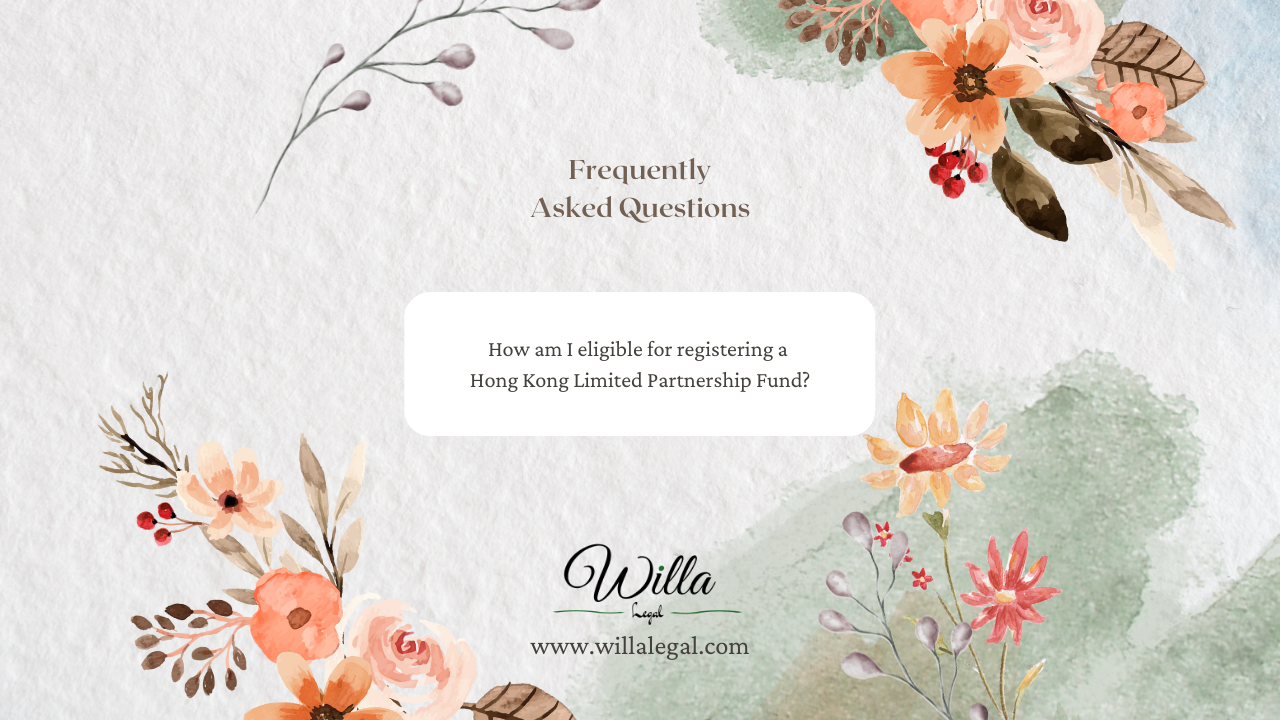
How am I eligible for registering a Hong Kong Limited Partnership Fund (HKLPF)?
1. You need to have a “fund”.
You need to have a “fund” to register a HKLPF.
An arrangement in respect of any property is a “fund” if:
- the property is managed as a whole by or on behalf of the operating persons and/or the contributions of the participating persons and the profits or income from which payments are made to them are pooled;
- the participating persons do not have day-to-day control over the management of the property (whether or not they have the right to be consulted or give directions in respect of the management); and
- the purpose or effect of the arrangement is to enable one or more operating persons and participating persons to receive profits, income, gains, payment or other returns arising from acquisition, holding, management or disposal of all or any part of the property.
It is possible for a single investment fund (a fund that has only one investment) or a single investor fund (a fund with only one investor) to be a fund under this Ordinance because the property is managed as a whole.
For day-to-day control over management of the property, the general partner will be the person managing and operating the fund and is responsible for appointing an investment manager for the day-to-day investment management functions of the fund. On the other hand, limited partners, even with a voting seat in the limited partners advisory committee or have a right to veto any investment proposals made by the general partner is considered as having no day-to-day control over the management of property.
2. There is no restriction on the investment strategies of your HKLPF fund.
“property” is a very wide concept and it includes:
- money, goods, choses in action and land, whether in Hong Kong or elsewhere and obligations, easements; and
- every description of estate, interest and profit, present or future, vested or contingent, arising out of or incident to the aforementioned.
In other words, not only does it capture listed equities and derivatives (like what most hedge funds and quant funds invest in) and private equities (like what most PE funds and VC funds invest in), it also captures land, buildings and real estate (like what most real estate funds invest in), virtual assets (like what most crypto funds invest in), arts, antiquities, commodities and carbon credits.
These are just a few examples. Fund managers usually have better investment sense and commercial acumen than lawyers. The point is fund managers can be very innovative and niche in their investment strategies and HKLPF structure can still be explored for their funds. Of course, the funds should not be set up for unlawful purposes, or for promoting or committing crimes (but that is common sense).
There are other considerations for determining a fund structure, e.g. cost, tax and operation.
3. Some arrangements are NOT a “fund” and thus cannot be registered as a HKLPF.
There are also certain arrangements which are not considered funds for the purposes of HKLPF registration.
Employee incentive scheme: Carry plans and employee incentive schemes offered by fund managers could fall within this carve out. Hence, if a fund manager is considering HKLPF structure for its carry plans or employee incentive schemes, analyses should be made to see if the proposed carry plan or employee incentive scheme could fall within the “fund” definition and meet the eligibility requirements for registering a HKLPF.
If each limited partner is a bona fide employee or former employee of a corporation in the same group of companies as the general partner, or a spouse, widow, widower, minor child (natural or adopted) or minor step-child of such employee or former employee, it will not be a fund.
A corporation is considered to be in the “same group of companies” as the general partner if the general partner is the holding company of such corporation, or such corporation is the holding company of the general partner.
One corporation is considered a “holding company” of another corporation if:
- one controls the composition of the other’s board of directors (i.e. it has the power to appoint or remove all, or a majority, of the directors of the other corporation without any other person’s consent);
- one controls more than half of the voting rights in the other; or
- one holds more than half of the issued share capital (excluding any part of the issued share capital that carries no right to participate beyond a specified amount in a distribution of profits or capital) of the other.
In practice, as long as at least one limited partner is not a bona fide employee or former employee of a corporation in the same group of companies as the general partner, or a spouse, widow, widower, minor child (natural or adopted) or minor step-child of such employee or former employee, such employee incentive scheme or carry plan would not fall within the carve out, and could still be considered a “fund” for the purposes of HKLPF registration.
Not a business: An arrangement that is operated by a person otherwise than by way of business is not a fund. Business should be given its ordinary meaning and it includes every trade, occupation or profession, unless the context otherwise provides. Typically, if the general partner or the investment manager is charging a fee from the fund, it is a business.
Franchise: Franchise arrangements under which the franchisor or franchisee earns profits or income by exploiting a right conferred by the arrangement to use a trade name or design or other intellectual property or the goodwill attached to it are not funds.
Arrangements prescribed by notice by Financial Secretary: The Financial Secretary may by notice on Gazette prescribe that an arrangement, or a class or description of arrangements is not regarded as a fund. As the date of the publication of this FAQ sharing, no such notice has been published on Gazette.
These materials have been prepared by Willa Legal for informational purposes and are not legal advice. This information is not intended to create, and receipt of it does not constitute, a lawyer-client relationship. You should not act upon this information without seeking independent legal advice.

